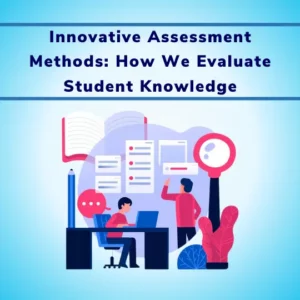Building the right workforce is one of the most crucial aspects when it comes the business perspectives. It is a fundamental one of the core operations to hire the right candidates for getting your work done and shaping your organization.
Did you know, in the 1990s; most companies used to consider interviews as the sole basis of candidate selection? With changing times and experiences with the employees, the companies started improving the interview process; in mid 90s, companies started involvement of the psychologists as a part of interviewer’s panel. These efforts were fulfilling and improved the hiring process to great extend.

Moving ahead, Now in 2022, the scenario is completely changed, the interviews are just a part of process and not a sole basis of candidate selection. While interviews give great insights on the candidate’s behaviour, nature and qualities, it may not project the real scenario. A better way to assess the candidate would be to check the situational aptitude, emotional intelligence, and subject knowledge of the candidate using specially designed tests.
While many may deny the need of additional screening parameters like the aptitude and psychometric tests, it must be taken into consideration that the human resource is the most important resource of an organization. And the amount and efforts spent in selecting the right candidate should be considered as an investment and not the cost.
The conventional interview process has many flaws, the first step towards improving the process is to analyze and understand to limitations of existing process. Let’s understand the challenges of the current interview process and the possible solutions to improve it.
Article Contents
Limitations of the Current Interviewing Process
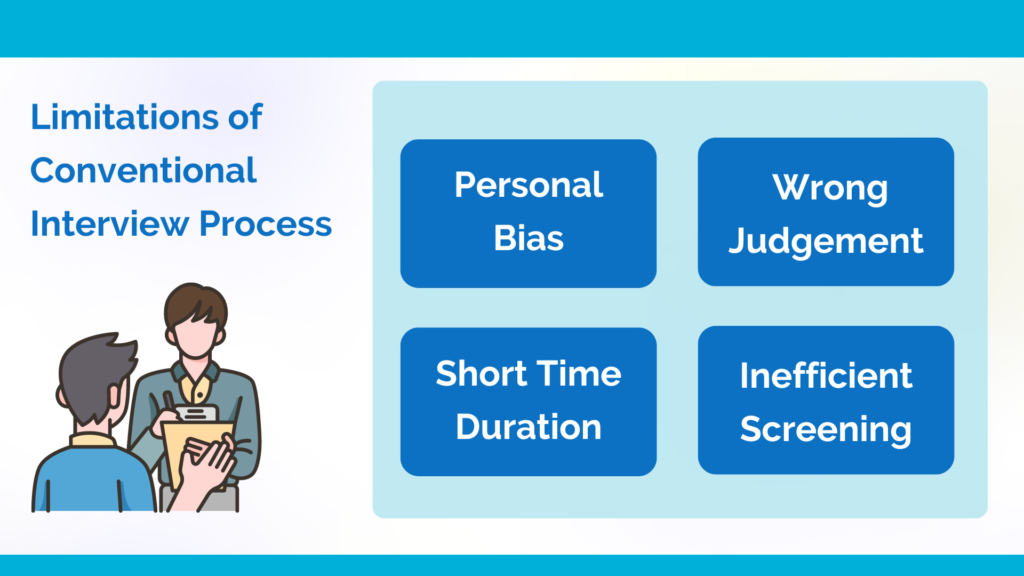
Want to overcome these limitations ?, here is how you can start
Be open to accept that “One size doesn’t fit all”
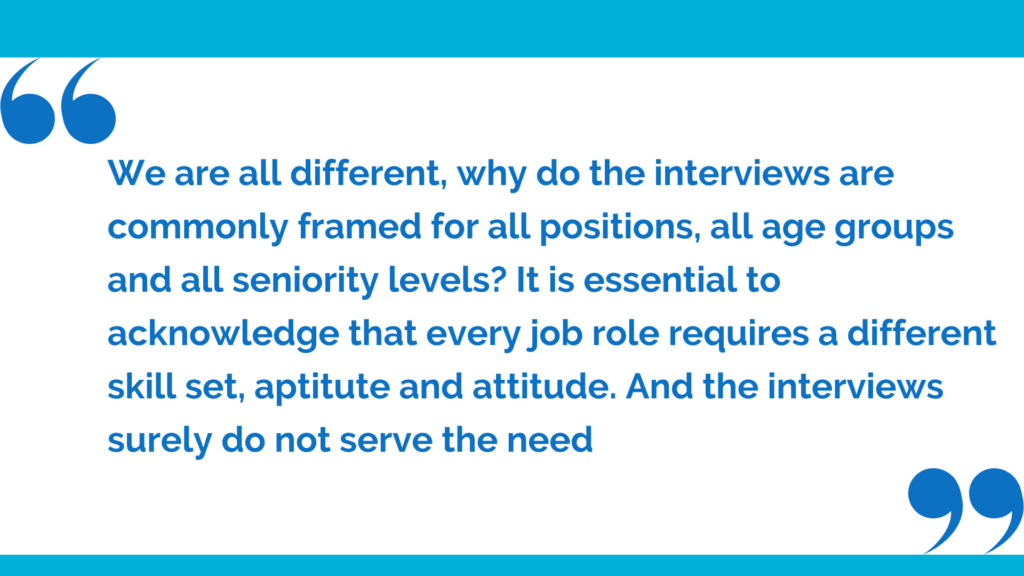
This is the most common mistake that many employers commit consistently.
We must understand that each position and role demands a different set of skills and abilities to deal with challenges that may occur.
Technical rounds are far away; an initial couple of discussions give you much clarity on the values the candidate is driven by and the candidate’s skills.
It’s an excellent opportunity to gauge the candidate and plan further rounds with the suitable complexity to hire the right fit.
A simple solution could be to have a flexible interviewing process custom-tailored for every position you hire for.
Again, if you are doing bulk hiring for technical positions, it’s essential to have a set ground for the technical talent you want. This shall help you quickly filter out the right talent and hire better, with a purpose.
The Personal Bias exists, your recruiting team might not be an exception
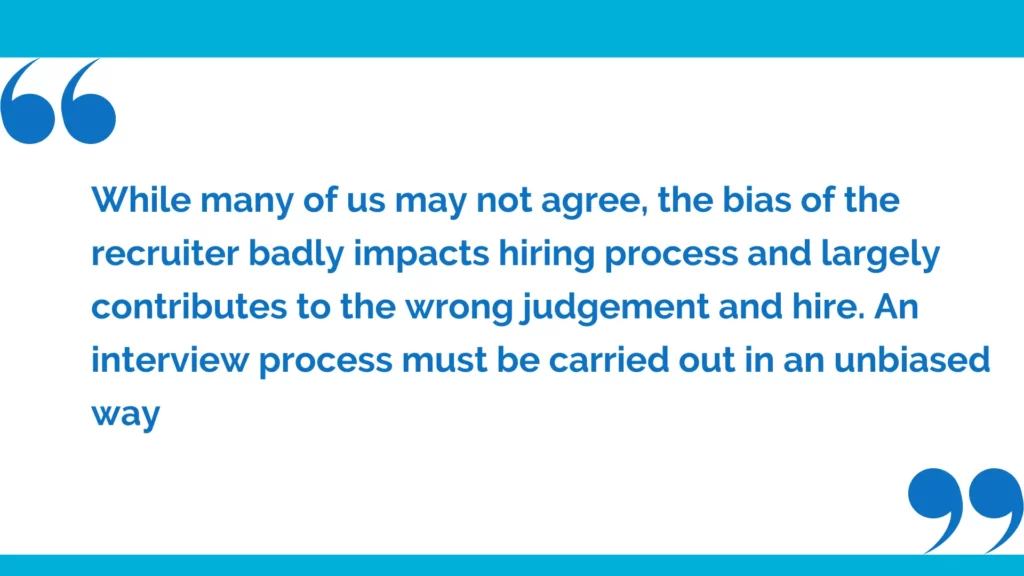
Let’s face it and agree that this is one of the root causes of poor hiring practices.
Any interviewer will be influenced by their personality, group biases, and personal biases. The best way to minimize bias is to use a predetermined set of questions or a scoring system.
It’s a no-brainer that your interviewing panel doesn’t always do this on purpose. Sometimes it becomes difficult to distinguish between the better and the best.
And, who knows, hiring the best might be a disaster when delivering the requirements.
Is there a way to tackle personal bias?
An eminent way to avoid these situations when hiring next time is to go for Pre-hiring assessments or screening tests. These assessments can be a saviour for creating a safe and unbiased hiring environment.
It is a mandatory skill for a recruiter to be able to figure out when an interviewee is misleading
Right before we jump into this, an eye-opener!
About 85% of people lie on their resumes!
I know it hurts, but that’s the truth!. Data says the same. Also also, it is better to be cautious.
Well, coming back to the point, an interview is not any different from the famous seller-buyer affair!
No matter how calm, composed, and well-versed the buyer(employer) is, the seller(interviewee) will put out every ounce of persuasion on stake to convince the buyer. And, it’s difficult to separate the lies from what’s being shared unless and until we get into a certain depth.
It’s hard enough to strike the difference at a glance during the interviews.
This is a surreal challenge for today’s employers compared to the other challenges.
An approach like personality or aptitude tests can be used to evaluate the quantifiable parameters of a candidate’s stature.
Screening tests are as equally important as the interview
The world is evolving faster than we can even imagine, work from home was not even a concept for many; and today, it is a reality. Many people believe that work from home is even better than wroking from office. Similarly, the technology based interviews and online tests are the technology of future.
Before personality skills, intelligence and skills assessments and even cover letters were in the picture. It was the era of face-to-face interviews. With COVID-19, online interview methodologies have surged, making an evolution.
Businesses and Recruiters still have a dilemma around the hiring process getting more complex and lengthy daily. Nevertheless, it’s all happening for good!
Many business leaders are well aware that hiring a new employee is an expensive affair. When the long-run goal is for the candidate to play their role to add to the business, new recruitment goes hand in hand with much-added risk.
Without actually working with someone and getting to know their work style, it is hard to tell if that person will live up to their CV claims and add to the business.
Hence, there are probation periods, and also one of the reasons for the hiring process is lengthy.
To put it all together, the assessments relieve the likely scraping, assure both parties’ expectations are met, and do the risk analysis if the investment is worth taking the risk.
To do the same, organisations must ensure that their future employees have the proper ability and skill set to fulfil the responsibilities assigned and bring business to the company.
Then there is also the need to evaluate the cultural fit. It is vital because it will disrupt or elevate the operations or the existing team.
And that’s precisely where pre-hiring assessments or screening tests come into the picture.
Almost 80% of companies rely upon some assessment tool in their external hiring process.
Let us know more about the role, types and technology for pre-hiring assessments
Psychometric Assessments
What are psychometric assessments?
Psychometric tests include questions that calculate the degree to which the candidate’s ability and personality match the required one for the put-out position.
The two prime types of psychometric tests are:
Personality tests:
These tests enable the employers to assess the candidates’ ability depending on their behaviour and approach to work.
Generally, in a questionnaire, this assessment probes the candidates’ attitudes, behaviour, motives, preferences, and values.
Usually, the tests require the candidates to rate the sentences from “strongly agree” to “strongly disagree”.
Ability Test:
On the contrary, the ability test aims to assess general or specific skills that are vital for the job.
These usually include verbal, numerical, and abstract reasoning assessments with images needing interpretation.
When can Psychometric Assessments be put to use?
Even Though there are no specific rules on when to use the psychometric assessments, they are usually used as a part of the last recruitment process.
It depends on the hierarchy of the put-up position and the company size.
Despite having said that, it has to be brought to notice that few companies are inclined to use the psychometric tests in the initial process steps to pace up the hiring process and land with the select few shortlisted candidates.
Organizations who receive bulk applications see it wise to use psychometric tests at the early stages to shortlist the select few candidates for the further step in the hiring process. If your are looking for a bulk hiring solution, the psychometric tests can be combined with Audio based bulk interviews.
Why use Psychometrics Assessments?
Hiring depending upon the screening methods of resumes and cover letters, backed by background checks, are the past methods.
Reason?
Because there are always chances that the candidates cannot always be eligible enough as mentioned on their resumes, and even the background references can be biased or set up.
In today’s date, organisations are looking for something that is beyond just hard skills. Their inclination is more towards a holistic approach, wherein they want to see the soft skills, interests and hobbies, motivations, and primely the capacity to work well with a team.
Aptitude Tests:
An unbiased approach to the hiring process is Aptitude tests.
These assessments evaluate the candidates using numerical reasoning, critical and logical thinking, problem-solving skills, viral and spatial cognition, verbal correspondence, and many other methods.
Importance of aptitude tests:
Fundamental aptitudes are vital to performing well in any job, no matter the industry.
That is precisely why measuring the aptitudes of the candidates using a set of targeted questionnaires eases the job for organisations in hiring decisions.
Aptitude tests are the ultimate methods to analyse the candidates’ job fitment and success.
When paired with interviews, aptitude tests help better analyse the candidate’s potential accurately.
What can be achieved with Aptitude Tests?
- Objectively calculate the mental capacities required for the put-up job
- Provide the employers with certain kind of information about the candidate that regular interviews fail to give
- Can be customised as per the varied professional requirements for the open job positions
Aptitude tests are undoubtedly one of the most widely accepted type of pre-hiring tests. Aptitude tests that are conducted pre-hiring mix up the candidates’ general aptitude and practical capacities. Hence, these tests are highly accurate in determining the right person for the job who will perform at an optimum level in their job roles.
Role of Technology in Streamlining the Hiring Process–
Right before we jump in, bursting some facts around how hiring technology is shaping up!
Over 98% of fortune 500 companies use recruitment software and hiring automation.
Companies globally are leaning towards a tectonic shift for most operations where they can rope in automation and ease the load. Hiring & Recruitment is one such vital function awaiting their turn.
Yes, I agree that we can’t automate the hiring function entirely as it requires that human touch before onboarding someone on the team. But, hiring automation can indeed be adopted to reduce the flaws and errors in the manual process, and nevertheless, costs accumulated for wrong hires!
Here is a case study how a multinational company could automate the recruitment process using technology.
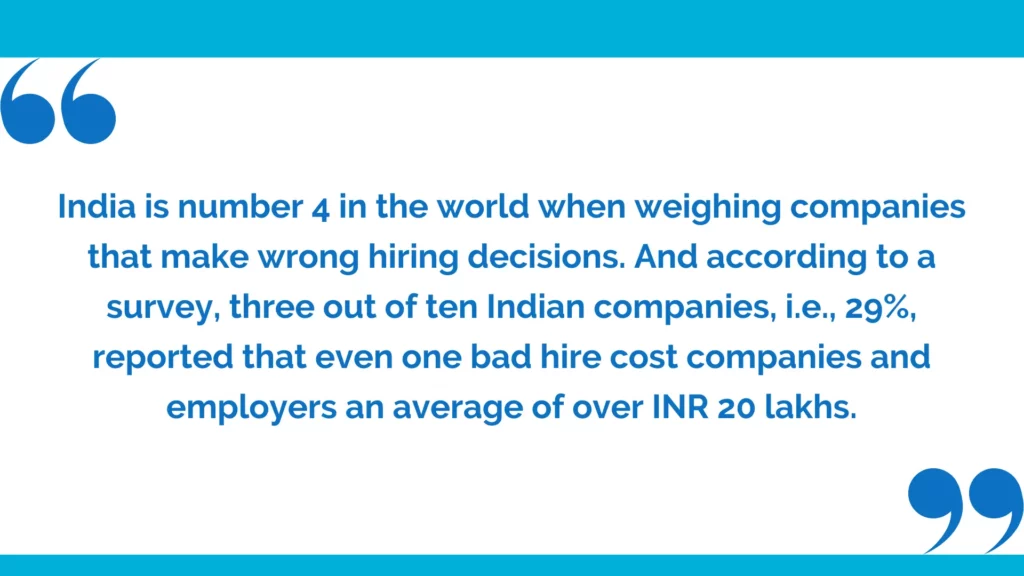
Let’s understand how hiring automation is shaping up!
Getting AI at Work with Pre-Hiring Assessments
Job scenarios usually ask multiple candidates to apply for the same put-up job position. It becomes complicated when multiple candidates have the same kind of experience, academic background, and credentials.
In such scenarios, creating the suitable filtration criterion without any bias can help the organizations choose the right fit candidate. Pre-hiring assessments are a great way to evaluate a candidate’s cognitive capabilities and personality traits.
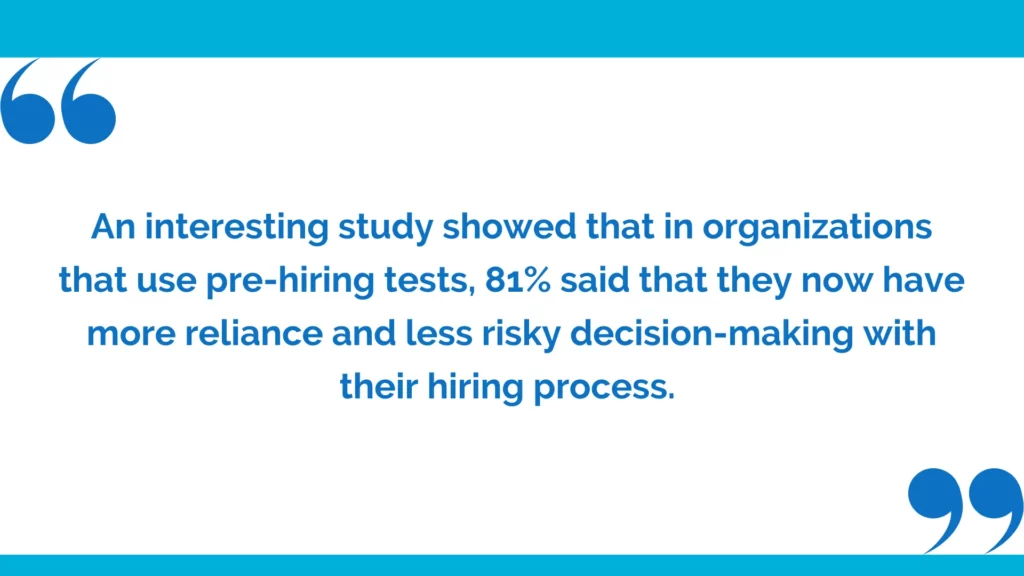
With AI joining hands, these tests can help gather more in-depth insights about a candidate’s overall capabilities. And alters the hiring process, making it light-weighted on academics and experience, and more focused on calibre and skills.
88% of companies globally already use AI for HR (SHRM, 2021).

Coding Skill Assessments – Healing the pain in the neck for technical recruitments.
The pain of recruiting technical talent is real.
Almost 9 out of 10 HR professionals(86%) say that they find it challenging to find and hire technical talent. 36% of them find it very challenging – Reported by Indeed Survey.
Hiring for technical roles has to be done differently and demands technical literacy at different levels of interviews.
It’s a blessing to have invested in technical/IT recruiters as they make the vetting and screening of candidates for the role more manageable. The real challenge is to gauge the candidate’s logical abilities and proficiency for the desired role.
Traditionally, the senior programmers or the project leads would spend time interviewing the candidates. They would check for the desired programming proficiencies and knowledge and pass through a practical orientation exercise, depending on the complexity of the role.
With the rapid growth of IT, the workload is at its peak, and it’s getting difficult for senior programmers and managers to contribute to interviews and hiring. Even if they do, there are fair chances of them suffering from interview fatigue, which increases the chances of landing wrong hires.
Coding assessment is an apt solution for organizations willing to hire for a variety of positions with complexity grade ranging from moderate to high.
Coding assessments let you analyze the analytic capabilities of the candidates with improved accuracy and reduced bias during your technical recruitment. It enables you to define customized coding tests irrespective of the coding language of your choice and lets you evaluate the candidate’s abilities in varied dimensions.
Conducting your own conding assessment is simple, here is how you can conduct your own conding assessment
Proctored Interviews
With the remote setup, most organizations have shifted their recruitments online and are using video conferencing tools to conduct interviews.
How safe do you feel these conferencing tools are?
In an uncontrollable environment, there is room for malpractices and play disguise when you are sitting kilometres away from the candidate.
60% of recruiters and hiring executives use video technology (Jobbatical, 2020).
If that is so, why not have a controlled environment while conducting video interviews to prevent cheating and disguise?
Proctored Video interviews can be leveraged to automate the hiring process to a considerable extent.
You must define a custom assignment based on the skill or domain knowledge and assign a slot to the candidate. The interview activity is captured and stored in the cloud with a recording feature. And the employer can refer to the recording at their convenience.
This simple AI-driven automation can full-proof your recruitment process from all sorts of malpractices and helps you scale it up to the level you always wanted.
These proctored interviews also find acceptance among the candidates and are easy to attempt. Anyone with very basic knowledge of using a computer can attempt the video interview.
Here is how the candidate can attempt a video interview
Closing Notes–
Building and maintaining workforces is a herculean task today. With the changing workforces’ changing needs, the hiring and recruitment practices are expected to gear up.
68% of recruiting professionals say that investing in new recruiting technology is the best way to improve recruiting performance over the next five years.
There are many challenges that recruiters are facing today, and technology certainly has the answers to all of them. You need to have the eye to identify the problem, and there is tech to back it.
FAQs
Pre-hiring tests are designed to assess the candidate in terms of general and situational aptitude, subject knowledge, emotional intelligence and job related skills before the interview. Pre-hiring tests are nowadays an essentail part of the hiring process of the major corporations around the world.
With the latest technology, it is easier than ever to conduct the aptitude test. All you need is a device with internet connection. You can start with the free trial of the online assessment platform that supports aptitude tests. You can explore the u003ca href=u0022http://www.Eklavvya.comu0022u003eassessment platformu003c/au003e and choose the features to go ahead with. To kick start your journey; you will also be provided with the training and training videos as required.
Skill assessments, also called as skill based tests are the tests designed specially to assess the job role related skills and expertise of the candidate. These tests are oriented to check the subject knowledge and fitness of of the candidate for job role.
No, the online aptitude tests are conducted in proctored mode. A remote invigilator; also called as proctor, can monitor the activity of the candidate during aptitude test. The remote invigilator can access camera/microphone/browser log based on the type of proctoring employed. These tests request the access to camera and microphone prior to the start of test.
Yes, it is one of the major perks of the technology that you can now conduct the bulk interviews using proctoring solutions. The u003ca href=u0022https://www.eklavvya.com/video-interview/u0022 target=u0022_blanku0022 rel=u0022noreferrer noopeneru0022u003evideo interview technologyu003c/au003e can help you to conduct thousands of interviews simultenously.




![How Government-Led Exams at 250+ Locations Are Setting New Standards of Integrity [Case Study]](https://www.eklavvya.com/blog/wp-content/uploads/2024/04/Enhancing-Exam-Integrity-Government-Certification-in-250-Locations-150x150.webp)
![Transforming Central Govt. Exams Evaluation: How Onscreen Marking is Leading the Charge [Case Study]](https://www.eklavvya.com/blog/wp-content/uploads/2024/04/How-Onscreen-Marking-Revolutionized-Central-Govt-Exams-Case-Study-1-150x150.webp)
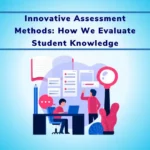
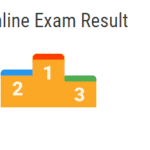

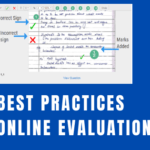








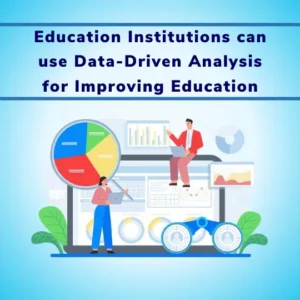

![How Onscreen Marking Revolutionized Central Govt Exams [Case Study]](https://www.eklavvya.com/blog/wp-content/uploads/2024/04/How-Onscreen-Marking-Revolutionized-Central-Govt-Exams-Case-Study-1-300x300.webp)
